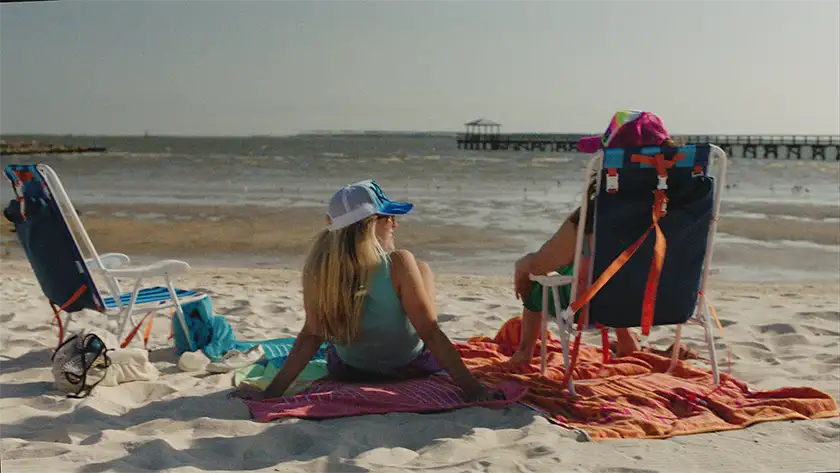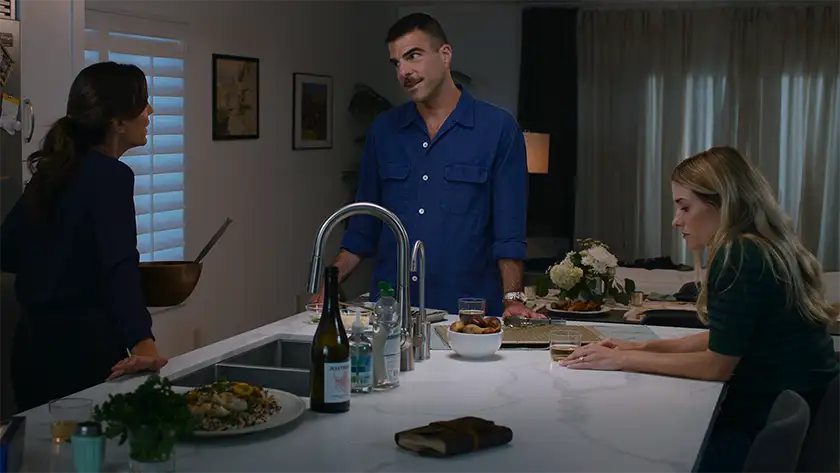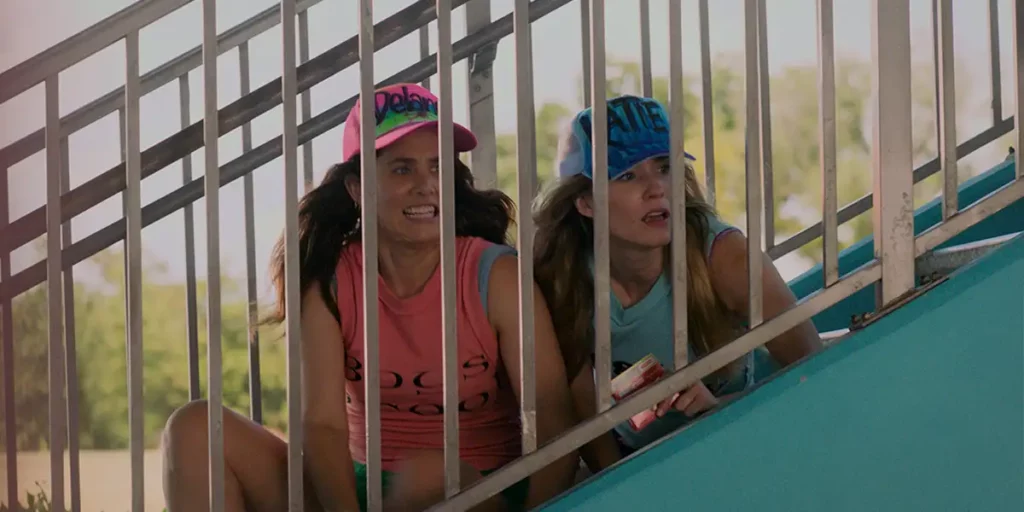We interview Adult Best Friends director/star Delaney Buffet and costar/executive producer Katie Corwin on their touching buddy-comedy.
When we sat down to interview the stars of Adult Best Friends Delaney Buffett and Katie Corwin, the two were seated next to each other, sharing a computer for our Zoom interview. If you’ve seen the film, this setup will come as no surprise. Buffett and Corwin play best friends in the movie, but their real-life friendship of 21 years served as the inspiration behind this new project that premiered at the 2024 Tribeca Film Festival.
Adult Best Friends examines the friendship between the film’s leads, Delaney and Katie, and both actors admit these characters are slightly exaggerated versions of themselves. Delaney and Katie, while best friends since the age of 10, are very different people at very different stages of their lives. Delaney is still in her party phase, going out every chance she gets and giving minimal effort at her job. The only person Delaney actually enjoys being around is her best friend Katie. Katie is put together and friendly. She is in a healthy, committed relationship with her partner John. While John is outgoing and extraordinarily patient with Katie and her co-dependent friendship with Delaney, Delaney is committed to not liking him regardless of how good of a guy he is.
When John proposes to Katie, she panics at the thought of having to tell Delaney, fearing what she anticipates to be an explosive reaction from her temperamental best friend. Katie devises a plan to take Delaney on a trip emulating their childhood beach weekends in order to soften the blow of the news. However, from the very start of the trip things do not go as planned, progressing into a series of unfortunate events and poor decision making. Amongst the chaos, Katie needs to find a way to break the news to Delaney before the news is broken for her.
In our conversation with Buffett and Corwin, we touched on this being their first feature film, the importance of female friendships and the ways in which we need to break in order to grow.
Adult Best Friends Being Made by Adult Best Friends
This film is such a beautiful and refreshing ode to the importance of female friendships. How did you decide this was going to be the first feature film you would tackle making as a team?
Delaney Buffett: Katie and I have been best friends since we were 10 years old. We wanted to write something personal for our first feature, because, although it might be clichéd to say, you should write what you know. It makes [the writing process] a bit easier, but the most heart also comes out of things you have experience with. We wanted to write something that was specific to our experience, but also very relatable and universal for everyone, and we wanted to do it in a comedic way because we write pretty hard comedy.
What we didn’t realize in casting ourselves is that once we got to set, because of our history, it would become more emotional than we had planned for. It was sort of our history and our friendship and our want to kind of tell this story that led us to choose it.

Katie Corwin: Something we talked about a lot is how lucky we are to have had this friendship for so long, but as they say, marriage does take work. It does take a certain level of commitment, and you need to make it a priority so you can grow alongside this person. You have to forego those expectations of what they’re going to want to do and who they’re going to turn into, because that’s where you find yourself limiting the relationship. So that’s something that we’ve had to work through together as we keep getting older, and deciding what’s right for me may not be right for you. We wanted to tell that story, but like Delaney said, through a comedic lens, and hopefully it resonates with people.
Speaking of you two as a filmmaking team, Delaney, you were first at Tribeca in 2017 for your directorial debut with the short The Spring. What is the experience of being back at Tribeca with this project you’ve done with your best friend like? How do the experiences differ?
D.B.: My first film was a short documentary. I think, one because this is a feature and two, because it’s scripted, there are a lot more elements to [Adult Best Friends]. So I’m a bit more stressed, but it’s really exciting. I love Tribeca: it’s amazing, and they gave me my first shot. That first experience in itself was amazing: it was my first time doing everything, and I loved it. Because it was a doc, I felt more loose and free with it. I think, for this, I’m a little bit more nervous, because we wrote it and we’re in it, and it’s a much more personal project to us.
I’m also incredibly excited, because in addition to Katie, one of my best friends Marie Nikolova produced it, and Cory Walls and Connor Hines, who are both in the movie, are very close friends. So getting to come to New York and be with everyone and share the experience of seeing the film with an audience is so great. I had an amazing time, the first time in Tribeca, and I’m really looking forward to doing it again with everyone.
Delaney Buffett and Katie Corwin on Putting Themselves in the Story
You said your characters are an exaggerated version of yourselves. Is it difficult to write yourself in a negative light or highlight real flaws that you may have in the interest of writing honest and dynamic characters?
Delaney Buffett: Yes, and no. Again, we’re so close and I think it’s a very vulnerable thing to write your worst qualities into something. Sure, they are our worst qualities on steroids, but the closeness that we have made it feel like a safe space. For example, Katie could write a joke about me being super judgmental and I wouldn’t be upset about it because I know how she actually feels about me and vice versa. I could write something about her people-pleasing and she would be like, that’s okay because I know how you actually feel about me, so I’m not offended.
Having each other made it a lot more palpable in recognizing, I am a judgmental person but I also am a nice person. You kind of have to lean into it to really specify the character at the beginning of the film. It is difficult but if you’re self-aware enough, and I think our humor is pretty self-deprecating, it helps.
Katie Corwin: That’s right!, I mean, the other person is there as a safety net to know what’s kind of too far, or to be able to qualify it as a reminder this is just the character. A lot of times when you’re writing yourself, it’s this dynamic of “I don’t do that and I don’t want that in there”. But it’s helpful having someone else there to say “No one thinks you do that, I don’t think you do that. I’m just putting it in here for the character”. It also is really helpful having that best friend’s assurance of “It’s okay, nobody thinks you actually do that”.
Your film captures the magic in best friendships and perfectly illustrates the concept of having a “comfort person”. How did you go about actualizing that magic in the script and recreating that feeling in a tangible way?
K.C.: That’s a good question, because it is hard to put on paper the kind of dynamic that best friends have. A lot of times, if there’s a third person with us and we’re going back and forth, they’ll say “Sorry, what? You guys haven’t said a full sentence in 90 seconds,” because there is a shorthand that best friends have. We found in the earlier stages of writing drafts it was hard to make it come across as genuine when you were actually planning it out, so we wanted to try to make an environment where we would feel comfortable. We would start the conversation with something that we had scripted, but then, once we actually were shooting, be able to relax it a little bit more so we could get more into ourselves and tap into that real dynamic.

D.B.: I also think we had to individualize our characters a bit, because Katie and I, in real life, are very similar. In many ways, we’re super different but at our core we are similar and for cinematic and story purposes we had to individualize. I had to be more of the curmudgeon-y, mean, judgmental person and Katie had to be more of the open one, but I think we really wanted to make a conscious effort on set and in writing that we were nice to each other. Even when our characters were bickering, it felt more like sisters.
Going back and forth between Katie’s character being mean to mine and vice versa, it’s something that obviously happens in real life but you have to be really careful on screen, because the audience will automatically have that feeling of “Oh, like, they’re not very nice to each other”. We’re really nice to each other in real life, but we do bicker quite a bit. It’s difficult to put that on the page or on-screen in a delicate way that shows that’s how best friends who love each other can act. It took a lot of editing in the script and in post-production to get into the groove of showing this friendship dynamic that serves the purpose of the story but also has authenticity built into it.
Buffett and Corwin On Finding Our Own Identity Within Best Friendships
It felt really intentional that you did not villainize Katie’s fiancé John in the film. I think a lot of times in these types of stories, if a man or partner comes in, they become the villain. Why was it important to not allow John to fall into this same category?
Delaney Buffett: I think it was because we really wanted to keep it as realistic as possible. I honestly think in real life you get very threatened when someone starts dating someone because they are occupying their time. Generally, if they’re a good person and they’re not trying to get between you two, there is a frustration of “Ugh, things are so different now”.
Katie Corwin: Your character says it perfectly: “I don’t hate you, I hate that you exist”. By keeping him perfect or faultless, showing he hasn’t done anything, it really puts a spotlight on Delaney being the problem here.
D.B.: Yes, it feeds into my personal issue with him too, because Katie wants it to be the three of us, but I just want it to be the two of us. I think him being nice and not even manipulative in the slightest really highlights our problem and our codependence. That’s why Mason Gooding is so great in this role and he played it so well because he’s just funny and sweet and has no intention of getting in between them.
As much as the film centers around friendship, it’s also a story about identity. There’s a great line about the need to individuate within these intense, long-term friendships. What was the process of creating a story that uses codependency as a vehicle of self-discovery?
D.B.: The individuating thing is funny, because when you’re a little kid you can bond over anything. It’s so easy to be similar when you’re in, say, third grade, and you both realize you like trundle beds or something unserious. You kind of become a unit and then just do everything together, but eventually, when you grow up and a partner comes into play or someone gets a job somewhere else, there is this gut-wrenching feeling of “Oh, we can’t do everything together”.
I think we wanted to tell the story about how Katie doesn’t want to choose because she’s so codependent on Delaney that she doesn’t want to upset her. We really wanted to use that in the story: we wanted to use the beach town to show they’re reverting back to childhood. It’s very nostalgic, but also, they come out of that realizing they are different. And we wanted to make a story that showed it’s okay to recognize those differences; we’re adults now. You might not necessarily want to get married, but I want to get married.
I think it’s this idea that, when you’re an adult, it’s okay to recognize between your friends you like different things, whether it’s liking different ice cream or different music: we can be our own individuals and still forge a friendship. This is something that is not the case when you’re younger, because you want to like all the same things and feel like you have to be the same, but that’s something you eventually grow out of.
K.C.: I think that’s scary too. You know, you hit that stage, and whether it’s in high school or college or after, all of a sudden the person that you think you’re always on the same page as is starting to go a different direction. It can start fights, but I think, underneath, that it’s really a fear that if you’re not the same, will you still be friends in spite of that? You start to think who’s in the right, who’s in the wrong, and is this the end of it?
That’s something we wanted to put in the movie, but we’ve also dealt with it personally because meeting at ten, now we’re both almost 33 there have been so many changes. We realize you have to loosen your grip on the other person and have faith that your similarities are not what’s keeping you together. What’s keeping you together is that you’re going to be there no matter what, and show support and love for the person. It doesn’t matter if you get married and the other person doesn’t or if you have kids and the other person doesn’t, or even if you’re a vegetarian and the other person isn’t, because that’s not what friendships are based on.
This interview was edited for length and clarity.
Adult Best Friends premiered at the Tribeca Film Festival on June 8-16, 2024. Read our Tribeca Film Festival reviews!

